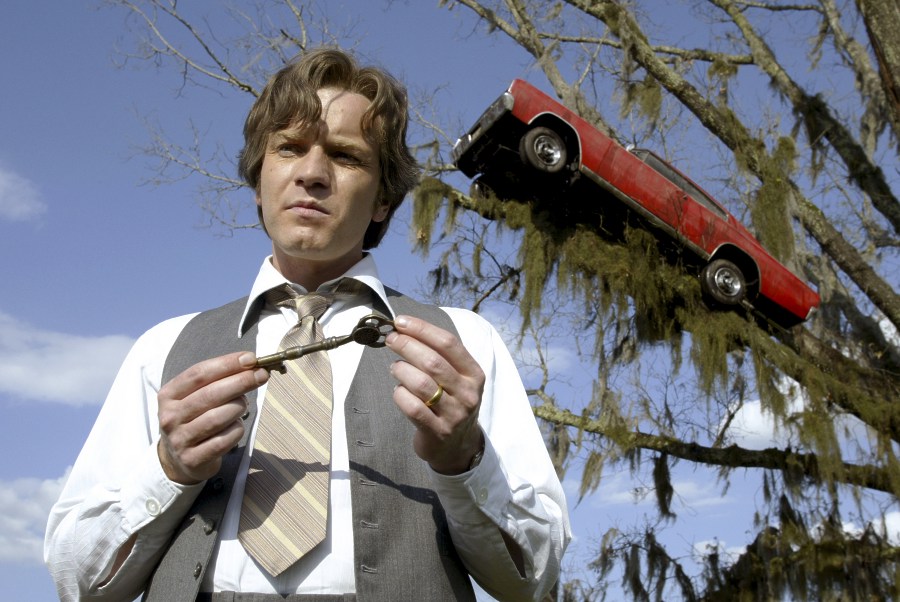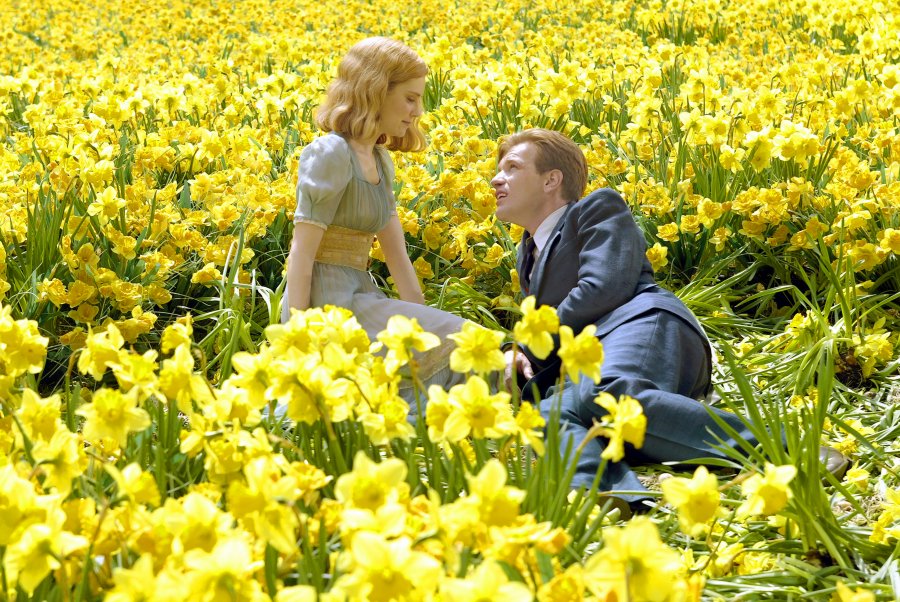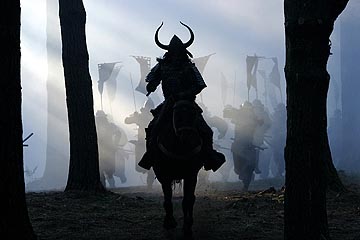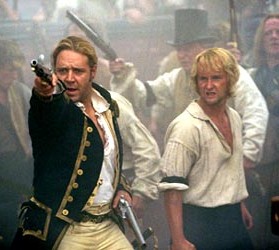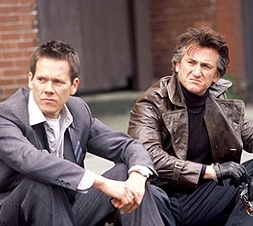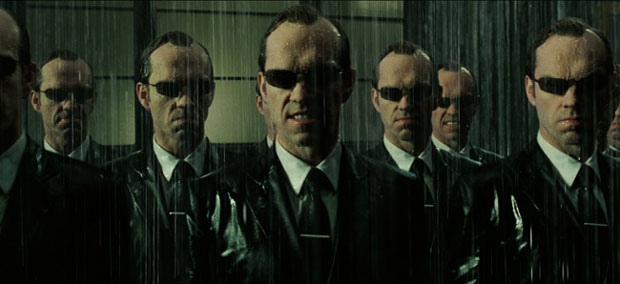
UGH. Well, the keyboard just fell to the ground and I lost a really long
Matrix: Revolutions review in one errant keystroke. As Neo might say, “Whoa.” So here we go again…Spoilers to follow throughout.
Like most of the fanboy world, I checked out Revolutions on Wednesday and, well, I guess Andrew O’Hehir of Salon might’ve said it best: It “isn’t a terrible movie, but it is a tremendous disappointment.” (Many people I’ve spoken to think that even this proclamation is being charitable.) As y’all may or may not remember, I actually liked The Matrix: Reloaded, and forgave it many of its considerable faults (the interminable first forty minutes in Zion, for example), because I assumed that much of the drier, talkier scenes were necessary for setting the stage for the final installment. And I thought that the Architect scene that closed Reloaded also opened many intriguing doors that promised future mind-bending plot twists in Revolutions.
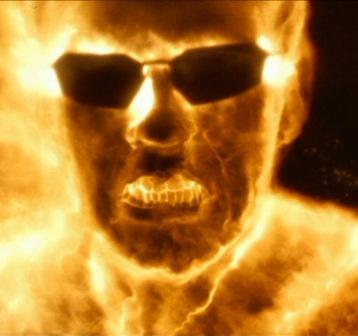 But, sadly, Revolutions capitalizes on barely any of this promise. Instead the Wachowski, um, siblings give us a closing chapter that is almost breathtaking in its inanity. For one, much of the time spent in Reloaded making the Merovingian (Lambert Wilson), Persephone (Monica Bellucci), and for that matter, the phase-shifting albino twins (“We are getting very aggravated”) decently compelling adversaries seems to have been completely wasted. None of Merv’s existential menace or Persephone’s prophetic allure comes to anything here — instead, they’re used as throwaway devices to set up an exchange in a goofy S&M joint which I suppose is meant to approximate Hell but comes off more like the Prague nightclub in Blade 2. As with the characters, so with the plot twists — Virtually every one of the intriguing questions dropped at the end of Reloaded (multiple Matrices, Neo’s real world powers) are either completely left by the wayside or just accepted by the story — Neo has powers in the Real World now because he does. Hmm, that’s not that interesting. It eventually seems that the only point of the film’s first half-hour (aside from the introduction of karmic programs, which I’ll get to later) is to rectify the Neo-in-a-coma cliffhanger of Reloaded, a cliffhanger that ends up having little or nothing to do with the trilogy’s main arc.
But, sadly, Revolutions capitalizes on barely any of this promise. Instead the Wachowski, um, siblings give us a closing chapter that is almost breathtaking in its inanity. For one, much of the time spent in Reloaded making the Merovingian (Lambert Wilson), Persephone (Monica Bellucci), and for that matter, the phase-shifting albino twins (“We are getting very aggravated”) decently compelling adversaries seems to have been completely wasted. None of Merv’s existential menace or Persephone’s prophetic allure comes to anything here — instead, they’re used as throwaway devices to set up an exchange in a goofy S&M joint which I suppose is meant to approximate Hell but comes off more like the Prague nightclub in Blade 2. As with the characters, so with the plot twists — Virtually every one of the intriguing questions dropped at the end of Reloaded (multiple Matrices, Neo’s real world powers) are either completely left by the wayside or just accepted by the story — Neo has powers in the Real World now because he does. Hmm, that’s not that interesting. It eventually seems that the only point of the film’s first half-hour (aside from the introduction of karmic programs, which I’ll get to later) is to rectify the Neo-in-a-coma cliffhanger of Reloaded, a cliffhanger that ends up having little or nothing to do with the trilogy’s main arc.
Speaking of the main arc, I’d think even the most rabid Matrix fanatics out there have to admit that almost all of the fanfic endings to Revolutions turned out to be more intriguing and well-thought-out than the real thing. Now I don’t have a problem with the peace treaty aspect of the conclusion – after watching the Animatrix prequels, that seemed almost inevitable. But, as J. Hoberman noted in a mixed-positive review, what we end up with here is one-part Christ allegory (perhaps Mel Gibson should’ve taken the role), one-part Return of the King, with Neo and Trinity rushing to Mordor before the White City falls. There are no interesting permutations to this formula along the way, no Matrix-like plot twist to take the film up a notch — instead Revolutions just grinds along inexorably to its rote conclusion. It would’ve been well nigh impossible for the Wachowskis to match the shock of Neo’s pod awakening in the first Matrix, but I think they could’ve approximated something along the lines of the Architect scene if they’d just tried a little harder.
Moreover, Revolutions as written fails to engage us in the characters we’ve been following along the way. One of the main three is reduced to little more than a Nien Nunb impression, while another dies (slowly) in what amounts basically to a Keymaker-like chauffeuring mission. Instead, we spend most of the movie watching the exploits of a Zion filled with uninvolving stock character tropes — the can-do kid, the grizzled sergeant, the take-no-guff officer, the scrappy girlfriend — take your pick. Frankly, the Wachowskis should be ashamed at the depths of cliche wallowed in here, in both the dialogue and the characters. Just grisly stuff.
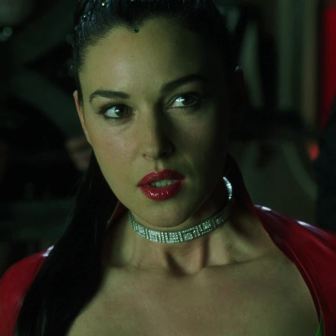 So why, after all these issues, am I still giving Reloaded a 2-star (6/10) review? Well, for one, I guess I am a sucker for big sci-fi spectacle, and the Zion invasion sequence does undoubtedly make for some compelling eye candy. It’d have been nice if the machines had relied on a variety of military mechs rather than just the ubiquitous Squiddies, but they are kinda creepy, and I did like the moment when they pour out of the dock breach like the blooming of a poisonous rose. And then there’s Agent Smith, who as per usual steals scenes every time he opens his mouth — His scene with the Oracle may be the high point of the film. Hugo Weaving (and Ian Bliss’s wicked Weaving impression) deserve high marks for bringing the type of grade-b, meglomaniacal fun to the table that this ponderous film so often needs (More Joe Pantoliano would’ve benefited both sequels too, I should think.) Alas, the rain battle between Smith and Neo at the end of the film also feels like a bust. It’s never as engaging as their fracas at the end of the first Matrix, and it definitely could have benefited from more Superman stylings (punching through buildings, swinging streetlamps like baseball bats, etc.)
So why, after all these issues, am I still giving Reloaded a 2-star (6/10) review? Well, for one, I guess I am a sucker for big sci-fi spectacle, and the Zion invasion sequence does undoubtedly make for some compelling eye candy. It’d have been nice if the machines had relied on a variety of military mechs rather than just the ubiquitous Squiddies, but they are kinda creepy, and I did like the moment when they pour out of the dock breach like the blooming of a poisonous rose. And then there’s Agent Smith, who as per usual steals scenes every time he opens his mouth — His scene with the Oracle may be the high point of the film. Hugo Weaving (and Ian Bliss’s wicked Weaving impression) deserve high marks for bringing the type of grade-b, meglomaniacal fun to the table that this ponderous film so often needs (More Joe Pantoliano would’ve benefited both sequels too, I should think.) Alas, the rain battle between Smith and Neo at the end of the film also feels like a bust. It’s never as engaging as their fracas at the end of the first Matrix, and it definitely could have benefited from more Superman stylings (punching through buildings, swinging streetlamps like baseball bats, etc.)
But I’m trying to accentuate the positive here. I did enjoy the Philosophy 102 lectures, even if they also seem inserted in as usual. To add to the existential and behaviorist disquisitions of Reloaded, we now have an emotive program discoursing on karma (also one of the better moments of the film) and Smith making a case for nihilism. You could read Neo’s final fate as representing the necessity of all philosophies to grapple with the inevitability of death, although it seems more pertinent to explain it as simple messiah martyrdom, given all the throwing around of words like “faith” and “belief” through the film. (The kid’s “I believe in Neo!”, for example…ugh.) Actually, trying to interpret the ending of the film brings me to my biggest problem with Revolutions: the movie turned out to be so pedestrian in its execution that it almost undercuts the intellectual legitimacy of the earlier films.
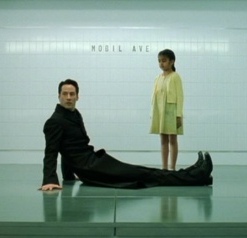 Put another way, while I think David Denby should be taken to task for the ridiculous snobbishness exposed in his Revolutions review (Denby writes that it is “far too late to bemoan the obvious truth that…college-educated gents, and millions of others like them, will spend many hours debating the apocalypse as revealed by the Brothers Wachowski but would die before reading a single story by Chekhov or Cheever dealing with the sensual and spiritual quandaries of ordinary people“), the film does suggest that much of the philosophical ruminations on the meaning of the Matrix trilogy may have been misplaced when the writer-directors are so glib and ham-handed as to finish it off with a mighty dollop of Christ-figure bathos, a sunset, and a little girl.
Put another way, while I think David Denby should be taken to task for the ridiculous snobbishness exposed in his Revolutions review (Denby writes that it is “far too late to bemoan the obvious truth that…college-educated gents, and millions of others like them, will spend many hours debating the apocalypse as revealed by the Brothers Wachowski but would die before reading a single story by Chekhov or Cheever dealing with the sensual and spiritual quandaries of ordinary people“), the film does suggest that much of the philosophical ruminations on the meaning of the Matrix trilogy may have been misplaced when the writer-directors are so glib and ham-handed as to finish it off with a mighty dollop of Christ-figure bathos, a sunset, and a little girl.
In sum, while the intriguing but flawed Reloaded suggested that the Wachowskis were going to swing for the fences in the final installment, ultimately it seemed that — action spectacle aside — they were content to settle for a bunt. Boo hiss.
